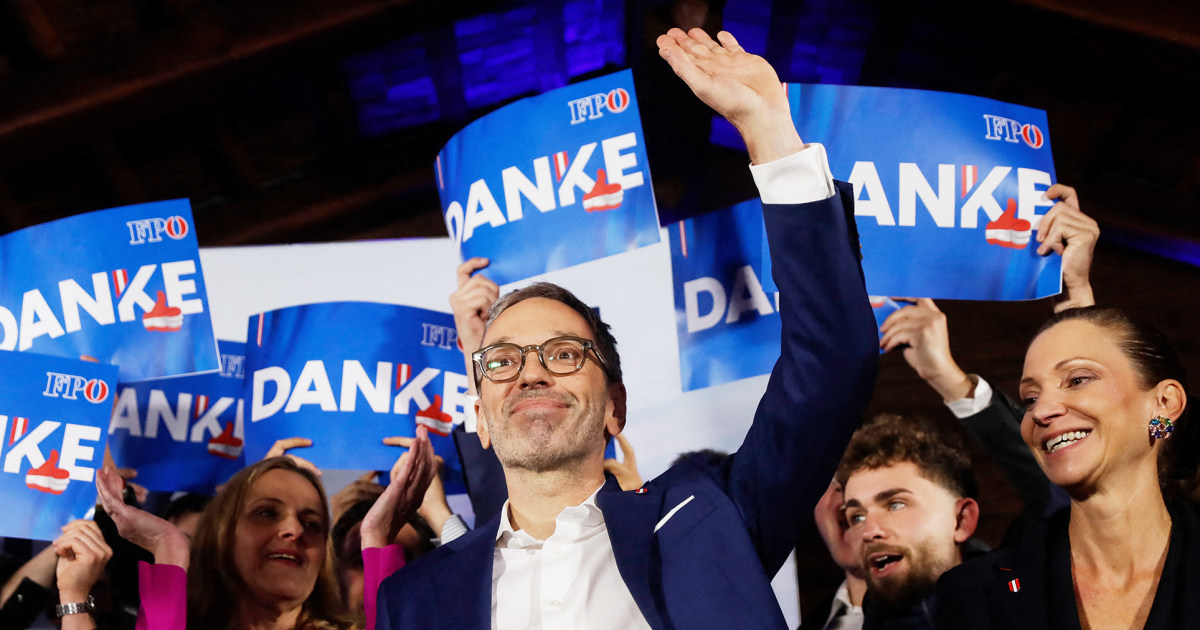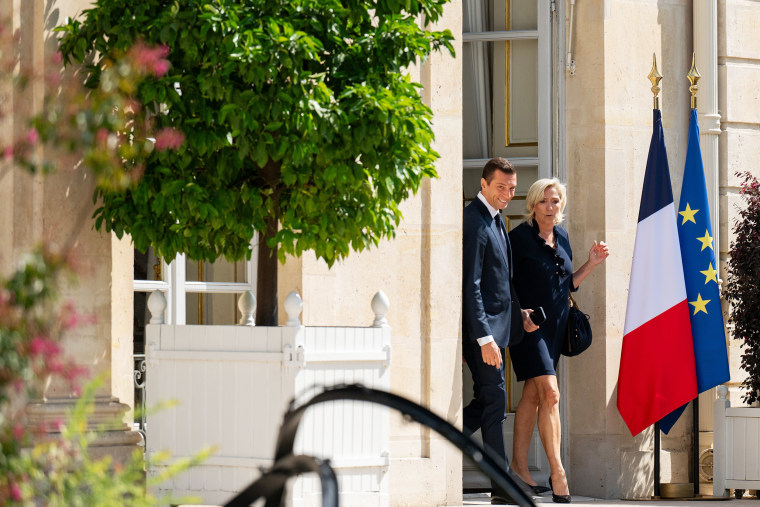A surging far right cements its place in Europe

LONDON — If Donald Trump wins the U.S. presidential election next month, he will find across the Atlantic a hotbed of political parties that share his rightward mix of authoritarianism, populism and extreme hostility to immigration.
This is the rise of the European far right, which reached a high-water mark on Sept. 29 when Austria’s Freedom Party won the largest share of votes — 28.9 % — in the national election. The FPÖ, as it’s known, was founded by former Nazis and wants to “remigrate” Austrian nationals with migrant roots to create a more “homogenous” society.
This is not a new trend, and its current cycle has been covered by NBC News and others for at least a decade. But the last 12 months have been a bonanza for this former fringe of the political spectrum. There have been big wins for France’s National Rally, led by Marine Le Pen, as well as for Dutch anti-Islam radical Geert Wilders and the neighboring Alternative for Germany, which is being monitored by Berlin’s own intelligence agency for suspected extremism.
“The overall trend is unmistakable: The far right is gaining ground,” said Matthijs Rooduijn, a politics professor at the University of Amsterdam. European “far-right parties are here to stay,” agreed Cas Mudde, a professor of international affairs at the University of Georgia and the author of 2019’s “The Far Right Today.”
Some scholars trace the roots of this surge to two events: the global financial crisis of 2007-8 and the 2015 spike in migration into Europe, fueled by wars and unrest across the Middle East and North Africa. The economic crash left Europeans poorer, with crumbling public services and infrastructure. The border crisis added to that a rapid influx of people, many from Muslim-majority countries.
It’s a familiar cocktail: an economically beleaguered population turning to racism as a salve. In recent decades, rises in immigration during economic downturns have pushed “voters to the most extreme version of the far right, blaming immigrants for unemployment,” according to a 2018 study in the London peer-reviewed journal Electoral Studies.
Today is no different, with historic inflation rates, the erosion of social programs and Europe’s energy crisis stoking economic angst.
“Indigenous people are being ignored because of the mass immigration,” Wilders, leader of the Dutch Party for Freedom, said last year. “We have to think about our own people first now. Borders closed. Zero asylum-seekers.”
Wilders, who rejects the “far right” label, has previously called Islam “the ideology of a retarded culture” and once suggested an annual “head-rag tax” of 1,000 euros (about $1,100) for anyone wearing Islamic clothing.
A hop over into France, Le Pen has attempted to soften her party’s image from the days when, in 2010, she likened Muslim street prayers to the Nazi occupation of France. Still, in 2017, she called France “a university for jihadists,” alleging it had become an incubator for Islamist terrorism.
NBC News contacted Wilders’ and Le Pen’s parties for comment on the criticisms against them.
The Alternative for Germany party, which is polling in second place in that country, said in an email that “terms like ‘right-wing extremist,’ ‘Islamophobic’ or ‘nationalist’ are only intended to distract from the real problems in this country.”
It said it “advocates the preservation of democracy” and claims it sees German citizens as equal “regardless of someone’s ethnic or cultural background.” However the party said it “clearly opposes an Islamist religious practice that is directed against the free democratic basic order, our laws and against the Judeo-Christian and humanistic foundations of our culture.”
It’s not just Muslims the AfD has offended. This year, its leader Björn Höcke was found guilty of knowingly using a Nazi slogan — “Everything for Germany!” — at a 2021 rally.
These parties often share Trumpian protectionist policies — from backing trade tariffs to opposing arming Ukraine — as well as economic populism, aspects of which have been more traditionally associated with the left: supporting pensions and social services, raising some taxes on the wealthy while lowering them for the working class, or price controls on rent and food during periods of high inflation.
Their most distinguishing platform, however, is not just their opposition to immigration, but also their suggestion that European culture and values are being replaced by those of others.
This “ideology of ethnic replacement” and “demographic redefinition,” which the parties are seeking to solve with an “expulsion of migrants,” sounds “awful when you think of the Nazism of the past,” said Nadia Urbinati, a politics professor at Columbia University.
Though mainstream parties often revile these policies and rhetoric, they have been nudged toward them by the electoral threat looming on their rightward flank. In Britain, the traditionally center-left Labour Party won an election in July while adopting a hard line on immigration and championing flag-waving “patriotic” values — something leftists saw as dog-whistle nationalism.
“The ideas of these parties have been legitimized by many mainstream right-wing parties, and political as well as media discourse has shifted to the right,” said Rooduijn, of the University of Amsterdam. “What was once considered radical has now become the new normal for many voters.”
In Europe’s multiparty arena, center-right and center-left parties tended to dominate the postwar era, with greens, pro-business “liberals” and the far right and left in smaller roles. But recent elections have seen the far right increasingly usurp centrist conservatives as the main right-wing force.
Observers once thought the limit of their vote share was around 20%, said Markus Wagner, a politics professor at the University of Vienna. “But that potential upper limit just keeps increasing.”
The far right is “no longer second fiddle to the main right-wing party. This really changes the dynamic of how parties compete,” Wagner said. “It seems plausible that we are moving towards a world where the main party on the right in many countries is a far-right party.”
Europe’s multiparty system has also held a shred of optimism for the mainstream, at least in the short term. Centrists can sometimes cobble together coalitions to keep out the far right — even if those parties are smaller individually.

In Austria, most have refused to form a coalition with the FPÖ. The former ruling conservatives, the Austrian People’s Party, said they would only consider it if the FPÖ’s leader, Herbert Kickl, is not included.
Whereas in France, Le Pen was kept from victory in June-July parliamentary elections by an intricate network of tactical voting between erstwhile rivals.
This type of dealmaking comes with risks.
“The question is how to respond to the growing right while remaining consistent with electoral democracy,” said Urbinati. “Not respecting the will of the voters is a dangerous sign of weakness and arrogance.”
Related
A New Book Argues That What Happens in Europe Doesn’t…
Remaking the World: European Distinctiveness and the Transformation of Politics, Culture, and the Economy by Jerrold Seigel “No issue in world
Poland plans military training for every adult male amid growing…
Poland’s prime minister, Donald Tusk, has said his government is working on a plan to prepare large-scale military training for every adult male in response t
2025 European Athletics Indoor Championships: Ditaji Kambundji secures women’s 60m…
Switzerland’s Ditaji Kambundji walked away from the 2025 European Athletics Indoor Championships in Apeldoorn on 7 March with much more than her first Europea
Takeaways from the EU’s landmark security summit after Trump said…
BRUSSELS (AP) — European Union leaders are trumpeting their endorsement of a plan to free up hundreds of billions of








